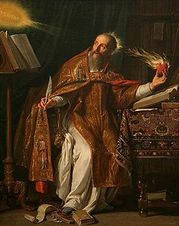Catholic Faith and Reason
- Homepage
-
Apologetics
-
Church Fathers
- 6th Century >
- 5th Century >
-
4th Century
>
- St. Ephraim (306-373 A.D.)
- St. Athanasius (295-373 A.D.)
- St. Basil the Great (330-379 A.D.)
- St. Gregory of Nazianz (330-389 A.D.)
- St. Jerome (340-420)
- St. Augustine of Hippo (about 354-430 A.D.) >
- St. Gregory of Nyssa (330-395 A.D.)
- St. John Chrysostom (about 344-407 A.D.) >
- St. Ambrose of Milan (333-397 A.D.)
- St. Hilary of Poitiers
- 3rd Century >
- 2nd Century >
- 1st Century >
-
Prayers
- The Holy Mass: Our Treasure from Christ
- Spiritual Communion
- Prayer to the Holy Spirit
- Prayers Before and After Holy Communion
- Prayer to Our Lady of Guadalupe
- Prayers to St. Joseph
- Prayer to St. Joseph for a Favor
- Prayer to St. Michael the Archangel
- Prayers of St. Francis of Assisi
- Prayer of St. Bonaventure
- Anima Christi
- Prayers of St. Thomas Aquinas
- Upcoming Events
- Bible Answers
- Conversion to the Catholic Faith
- Lectio Divina
- Our Blog
- Adult Faith Formation
- Resources
- Contact Us

